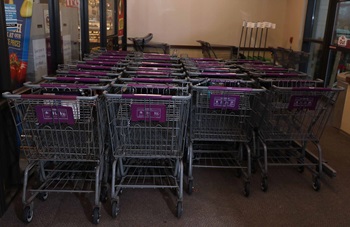By: Hannah Walker, Senior Director, Technology and Nutrition Policy, Food Marketing Institute
 The supermarket industry proudly employs 4.8 million Americans, paying almost $168 billion in wages annually. The grocery store serves as an area’s economic and social hub providing safe affordable food and jobs while investing in local communities all across America. One area in which the supermarket industry invests specifically is the communities it serves is USDA’s Supplemental Nutrition Assistance Program (SNAP). The supermarket industry is the proud private sector partner with the federal government by serving as the distribution point for SNAP food benefits to millions of food insecure households across the country. This partnership has created tremendous efficiencies, fraud reductions and cost savings in the program over the past several decades.
The supermarket industry proudly employs 4.8 million Americans, paying almost $168 billion in wages annually. The grocery store serves as an area’s economic and social hub providing safe affordable food and jobs while investing in local communities all across America. One area in which the supermarket industry invests specifically is the communities it serves is USDA’s Supplemental Nutrition Assistance Program (SNAP). The supermarket industry is the proud private sector partner with the federal government by serving as the distribution point for SNAP food benefits to millions of food insecure households across the country. This partnership has created tremendous efficiencies, fraud reductions and cost savings in the program over the past several decades.
Several decades ago, the federal government realized that unlike the grocery industry, its expertise was not in proficient and effective mass food distribution and that a public-private partnership could introduce significant efficiencies and cost savings. This partnership with the grocery industry started with paper food stamps, and later evolved into the streamlined electronic benefit transfer (EBT) system we have today. The grocery industry is a logical partner. Those who need assistance are our customers and can select from a variety of safe perishable and shelf stable food products for purchase with a combination of their EBT benefits, cash, WIC and other forms of tender.
SNAP authorized retailers invest significant resources to become eligible to participate in the program. Each authorized retailer must purchase its own point of sale equipment and software, train associates, and comply with strict retailer stocking and administrative requirements. For an industry that averages less than a two percent profit annually, every investment, including committing to participate as a SNAP partner, must be backed by a clear business case.
Since the 2014 Farm Bill was signed into law reauthorizing SNAP, FMI has worked closely with USDA to implement reforms to strengthen the program. At the same time, FMI has worked closely with the House and Senate Agriculture Committees as they draft the next Farm bill. This has been a multi-year process with dozens of hearings and ideas of all forms considered. FMI’s President and CEO Leslie Sarasin and Chief Policy Officer Jennifer Hatcher both testified before the House Agriculture Committee about the important role retailers play in SNAP.
Unfortunately, at this late point, proposals to “reform” SNAP that have not been vetted in a public policy forum are being offered by groups that apparently have goals other than solving problems. One of these proposals was released for the first time this week by the Bipartisan Policy Center. The BPC has indicated that its proposals are focused on only nutrition; however, several of their recently-released ideas recommend imposing new costs on retailers by having them pay processing fees to the state contracted EBT processor, requiring retailers to report every item purchased utilizing SNAP dollars at an individual store, and restricting what SNAP customers can buy using their benefits. Ideas like these and the Administration’s budget proposal to shift half of a family’s monthly benefits to USDA food boxes, potentially pulling the SNAP retailer and associates out of the partnership, all seem counterproductive to the efficiency and hunger prevention goals of the program.
Our open and competitive market is transparent and ensures year-round availability of fruits and vegetables, dairy, bread and protein in communities across the country. Increasing SNAP retailers' costs to participate threaten to drive up costs for all consumers.
The supermarket industry seeks to continue its work with Congress and the Administration to find new ways to improve the SNAP program and reduce government red tape and over- regulation that stymies growth and the ability to compete.


 Industry Topics address your specific area of expertise with resources, reports, events and more.
Industry Topics address your specific area of expertise with resources, reports, events and more.
 Our Research covers consumer behavior and retail operation benchmarks so you can make informed business decisions.
Our Research covers consumer behavior and retail operation benchmarks so you can make informed business decisions.
 Events and Education including online and in-person help you advance your food retail career.
Events and Education including online and in-person help you advance your food retail career.
 Food Safety training, resources and guidance that help you create a company food safety culture.
Food Safety training, resources and guidance that help you create a company food safety culture.
 Government Affairs work — federal and state — on the latest food industry policy, regulatory and legislative issues.
Government Affairs work — federal and state — on the latest food industry policy, regulatory and legislative issues.
 Get Involved. From industry awards to newsletters and committees, these resources help you take advantage of your membership.
Get Involved. From industry awards to newsletters and committees, these resources help you take advantage of your membership.
 Best practices, guidance documents, infographics, signage and more for the food industry on the COVID-19 pandemic.
Best practices, guidance documents, infographics, signage and more for the food industry on the COVID-19 pandemic.
